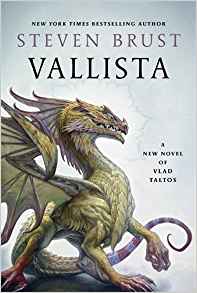Liz Bourke Reviews Vallista by Steven Brust
 Vallista, Steven Brust (Tor 978-0-7653-2445-0, $25.99, 334pp, hc). October 2017. Cover by Stephen Hickman.
Vallista, Steven Brust (Tor 978-0-7653-2445-0, $25.99, 334pp, hc). October 2017. Cover by Stephen Hickman.
Marissa Lingen, in her review of Steven Brust’s Vallista, noted that “[E]veryone has tolerance limits on the First Person Asshole voice.” One is accustomed to a certain degree of cocky assholishness from Vlad Taltos, but in Vallista, fifteenth and latest novel in the Vlad Taltos series, the first person asshole voice seems rather more assholish than in previous instalments. Perhaps that’s me growing older and less tolerant: what seems cool and rebellious in one’s early twenties begins to seem juvenile as life goes on. Or perhaps Vlad really has grown more abrasive over the course of the series.
Vlad is a human, a short-lived Easterner, in a society dominated by tall, long-lived Dragaerans (whose lives span hundreds of years). Once a member of the Jhereg – essentially the mob – in the city of Adrilankha, and a former assassin, he parted ways with his once-associates over a dispute about how much information about Jhereg activities the Empress ought to have. Now he wanders the empire with a price on his head.
Vallista opens in the city of Adrilankha. Devera, a strange and mysterious child, granddaughter of a goddess, daughter of a shade and the Dragonlord Aliera, born in the Paths of the Dead – a place that is a nexus of worlds and apparently, also, time – has appeared in Vlad’s life before. This time she shows up to ask for his help. She leads him to a strange manor on the cliffs outside Adrilankha. Once they enter, Devera disappears – but not before telling him she’s trapped and relying on him to get her free – and Vlad realises that the door has shut behind him with no way to open it.
This manor house has a number of strange inhabitants. There’s a ghost called Tethia who refers to the house as a “platform;” a reclusive lord who is not very responsive to polite questions; a large, pale, and probably violent monster about which none of the handful of servants wish to speak, although they appear to be afraid of it; a dancer who lives for her art; and a sorcerer who isn’t what he seems and who takes rather a strong dislike to Vlad. The rooms and hallways do not follow the usual rules of topology or geometry, with stairways down giving out on a higher level and doorways opening onto rooms that shouldn’t be there. The kitchen is empty of people and has no evidence of being used, and the pantry only contains apples, yet it smells like fresh food. And everywhere there are mirrors, which – Vlad concludes – tie into the sorcery that makes the house as baffling as it is.
Vallista‘s premise would make for interesting horror, or a locked-room mystery, which it is, in a way: it’s the story of a puzzle-box that Vlad needs to unlock. As Vlad explores the limits of the structure – this peculiar “platform” – he discovers that it connects to different points in time and in space, including to the Paths of the Dead. He also learns a few more things about the world and its metaphysics that tie in to some of the long-running questions (or mysteries) of the series.
This is very much a series book, and how much the reader will enjoy it will depend on how much they enjoy Vlad’s voice – and how much they enjoy Vlad, on his own, solving a puzzle. Brust likes to try stylistic and structural innovations (the history of the Vlad Taltos series contains several different experiments and departures), and it is rather innovative to put an assassin in a puzzle box and make him solve it. Unfortunately, Vlad in a puzzle-box without really striking characters to work with or around, or to banter with, and not engaged in life-threatening violence or tricky capers – that’s Vlad deprived of many of the things that make him a compelling character about which to read. It’s like watching a hobbled racehorse: the outlines of possibility are there, but not the consummation.
That’s not to say I didn’t enjoy Vallista. Even on his worst efforts, when it comes to prose, Steven Brust is a consummate professional, and, much like Lois McMaster Bujold, his weakest novels are still entertaining reading. Despite its meandering pace and predominant First Person Asshole voice, Vallista proved entertaining too. Just not as compelling, or as entertaining, as I wanted it to be.
Liz Bourke is a cranky queer person who reads books. She holds a Ph.D in Classics from Trinity College, Dublin. Her first book, Sleeping With Monsters, a collection of reviews and criticism, is out now from Aqueduct Press. Find her at her blog, her Patreon, or Twitter. She supports the work of the Irish Refugee Council and the Abortion Rights Campaign.
This review and more like it in the January 2018 issue of Locus.






